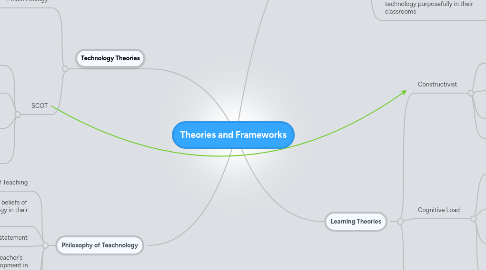
1. TPACK
1.1. Three types of knowledge teachers need to know and understand:
1.1.1. Technology
1.1.2. Pedagogy
1.1.3. Content
1.2. TPACK is the understanding of the complex connections and interplay between the three types of knowledge
1.3. It gives educators a simple way to display and conceptualize the role of technology in teaching and learning
1.4. Provides a framework for teachers to use technology purposefully in their classrooms
2. Technology Theories
2.1. Media Ecology
2.1.1. Technology influences society
2.1.2. People are impacted by the different forms and techniques of technology
2.1.3. Medium is the message
2.1.4. Media Ecology Association
2.2. SCOT
2.2.1. Social Construction of Technolgy
2.2.2. Society and the actions of people influence technology
2.2.3. The popularity of technology impacts whether or not it will be successful, not the quality of it
2.2.4. In addition, we can use this to determine what made technology successful or not
3. Learning Theories
3.1. Constructivist
3.1.1. Building connections by actively interacting with the environment.
3.1.2. Using basic skills to solve complex problems.
3.1.3. Learner constructs knowledge from personal experiences.
3.1.4. Teacher is a facilitator.
3.2. Cognitive Load
3.2.1. Two kinds of working memory: long term and short term.
3.2.2. The amount of information stimulating the brain has a direct impact on a person's memory.
3.2.3. Both over and under stimulation of the working memory impairs learning.
3.2.4. Teacher's need to be able to find the middle ground needed for succesful learning in students.
3.3. Connectivism
3.3.1. Creating connections and developing a network.
3.3.2. Expanding knowledge is more important than what a learner currently knows.
3.3.3. Ability to see connections between ideas and concepts is a vital skill
3.3.4. Learner must know where to find information rather than how to find it or what to find.
